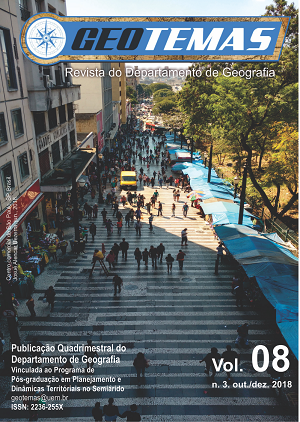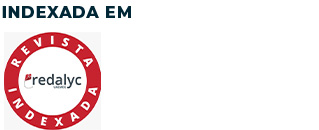Methodological practices for the analysis of the environmental perception of IFRN-campus students Pau dos Ferros, Rio Grande do Norte, Brazil
Keywords:
Environmental education, Sustainable attitudes, Awareness, High school, IFRNAbstract
Environmental awareness permeates all multidisciplinary areas in the search for present and future generations to have environmental equilibrium through sustainable actions. Given the above, there is concern about whether students are actually building this awareness that the importance of living in a balanced environment largely depends on human beings. The present research had as objective to analyze and evaluate the perception of the students of the Federal Institute of Rio Grande do Norte, of the Campus of Pau dos Ferros about its critical conception regarding the environment and its sustainable practices together with the society. The study was carried out through bibliographical research, debates, field practice and interviews using a questionnaire with a number of 180 students from six classes of the first and fourth year of high school between the years of (2014-1017). It was first established that students had basic information about the environment. However, there was no sense of empowerment and care for the environment, such as their belonging to it. After the activities carried out, the students presented a deepening of the subject, including to seek alternatives for preserving the environment in daily life. In this way, the importance of working with environmental education in high school was explored, in order to disseminate more and more the idea of environmental awareness through dialogue and a joint practice with society as an alternative of preservation and, therefore, conservation of the human species itself and of the planet Earth.
Downloads
References
ALMEIDA, O. S.; MACEDO, D. F.; SANTOS, V. C.; ANJOS, K. F. dos. Educação ambiental e a prática educativa: estudo em uma escola estadual de Divisa Alegre – MG. Revista Metáfora Educacional, n. 13 (jul. – dez. 2012), Feira de Santana – BA (Brasil), 2012.
ANDRADE, M. M. Introdução a Metodologia de Trabalho Científico. 7º ed. São Paulo Atlas, 2006.
BRASIL. Secretaria de Educação Fundamental. Parâmetros Curriculares Nacionais: meio ambiente: saúde. 3ª ed. Brasília: MEC/SEF, 1997.
BRASIL. Secretaria de Educação Fundamental. Parâmetros Curriculares Nacionais: terceiro e quarto ciclos: apresentação dos temas transversais. Brasília: MEC/SEF, 1998.
CARVALHO, J. A. M.; SOUZA, S. C. EDUCAÇíO E PERCEPÇíO AMBIENTAL NA ESCOLA: uma pesquisa com alunos e professores da Escola Estadual Professor Luis Soares no município de Natal no Rio Grande do Norte. Anais... VII CONNEPI (Congresso Norte Nordeste de Pesquisa e Inovação), Palmas, TO, 2012.
CARVALHO, I. C. M. Educação ambiental: a formação do sujeito ecológico. 2.ed. São Paulo: Cortez, 2006.
FERNANDES, R. S. et al. O uso da percepção ambiental como instrumento de gestão em aplicações ligadas í s áreas educacional, social e ambiental. In: ENCONTRO DA ANPPAS, 2., 2004, Indaiatuba. Anais... Belém: Associação Nacional de Pós-Graduação e Pesquisa em Ambiente e Sociedade, 2004. Disponível em: <http://www.redeceas.esalq.usp.br/noticias/Percepcao_Ambiental.pdf>. Acesso em: 30janeiro.2018.
FUCHS, R. B. H. Educação ambiental como desenvolvimento de atividades. (Monografia de Especialização em Educação Ambiental), Universidade Federal de Santa Maria. Santa Maria – RS: UFSM, 2008.
HALAL, C. Y. Ecopedagodia: uma nova educação. In: Revista de Educação, São Paulo, v. 7, p.87-103, 2009.
JACOBI, P. Educação Ambiental: Cidadania e sustentabilidade. In: Cadernos de Pesquisa. São Paulo, n.118, p.189-205, 2003.
KLOSSOWSKI, C. R. R.; MENDES, L. V. A EDUCAÇíO AMBIENTAL NA ESCOLA. Educação Ambiental em Ação. ISSN 1678-070, n. 44, a. XII, jun./ago., 2013.
LIMA, G. P. Educação ambiental crítica: da concepção í prática. In: REVISEA - Revista Sergipana de Educação Ambiental. São Cristóvão-SE, V. 1, Nº 2, 2015.
MACEDO, R. L. G. Percepção e Conscientização Ambientais. Lavras: UFLA - Universidade Federal de Lavras/ FAEPE – Fundação de Apoio ao Ensino, Pesquisa e Extensão, 2000.
MARCATTO, C. Educação ambiental: conceitos e princípios. Belo Horizonte: FEAM, 2002.
MOURA, A. C. de O. S. de. Sensibilização: diferentes olhares na busca dos significados. Dissertação (Mestrado em Mestrado Em Educação Ambiental) - Universidade Federal do Rio Grande, 2004.
NARCIZO, K. R. dos S. Uma análise sobre a importância de trabalhar educação ambiental nas escolas. REMEA - Revista Eletrônica do Mestrado em Educação Ambiental. ISSN 1517-1256, v. 22, 2009.
REIS, L. C. L. dos; SEMÊDO, L. T. de A.; GOMES, R. C. Conscientização Ambiental: da Educação Formal a Não Formal. In: Revista Fluminense de Extensão Universitária, Vassouras, v. 2, n. 1, p. 47-60, 2012.
SATO, M. Educação Ambiental. São Carlos: Rima, 2002.
SAUVÉ, L. Educação Ambiental: possibilidades e limitações. Educação e Pesquisa, São Paulo, v. 31, n. 2, p. 317-322, 2005.
SILVA, L. J. C. da. Estudo da Percepção Ambiental dos alunos do Ensino Médio no Colégio Estadual Manoel de Jesus, Bahia. 2013. 65f. Monografia (Especialização em Gestão Ambiental em Municípios). Universidade Tecnológica Federal do Paraná, Medianeira, 2013.
TUAN, Y. Topofilia: um estudo da percepção, atitudes e valores do meio ambiente. Trad. Lívia de Oliveira. São Paulo: Difel, 2012.
ZEPPONE, R. Educação Ambiental: Teorias e Práticas Escolares. 1. ed. São Paulo. Jm, 1999.
Downloads
Published
How to Cite
Issue
Section
License
Authors who submit their manuscripts to Geotemas declare that the work is an original article and has not been submitted for publication, in full or in part, in another national or international scientific journal or in another circulation vehicle. The authors also declare that they agree with the transfer of the copyright of the referred article to the magazine Geotemas (University of the State of Rio Grande do Norte), allowing for later publications, as long as the source of its publication is assured. Finally, they assume public responsibility for the article, being aware that any charges arising from a claim by third parties regarding the authorship of the work may apply to them.





















